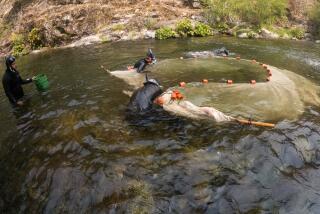California saves salmon from drought via trucks
California started giving a ride to millions of young Chinook salmon this week after the state’s record-breaking drought left rivers too dry for them to migrate on their own.
Over the next two months, state and federal officials plan to truck up to 30 million fish from five hatcheries in the Central Valley to rivers and streams near the Pacific Ocean, an effort intended to save the state’s fishing industry in coming years.
The salmon are a big part of California’s $1.5-billion commercial and recreational fishing industry, according to the Nature Conservancy. The salmon smolts — juvenile fish just a few inches long — should be mature enough to harvest starting around 2016.
PHOTOS: World’s most expensive cities
“It is a Herculean effort to avoid disaster in three years,” said Andrew Hughan, spokesman for the state’s Department of Fish and Wildlife. “By disaster, I mean a collapse of the fishery industry; no commercial fishing and no recreational fishing.”
Hughan said the state regularly gives a lift to millions of salmon every year. This week, however, the federal Fish and Wildlife Service also joined in and began trucking about 12 million salmon from the Coleman National Fish Hatchery in Northern California to a spot on the lower Sacramento River near Rio Vista.
The salmon begin their journey in climate-controlled tanker trucks filled with river water that can hold about 130,000 fish in all, cutting their typical migration by up to 300 miles. They are then acclimated to the new water for a few days in net pens before they are released into the outgoing tide.
It will take about 275 truckloads to transport the millions of fish at Coleman and four other state hatcheries, Hughan said. The total cost will clock in around $800,000.
PHOTOS: Richest and poorest cities in America
The U.S. Fish and Wildlife Service has moved salmon over land from Coleman a few times in years past, but the severe drought prompted the agency to make plans to truck all the fish this year, said spokesman Steve Martarano.
Martarano said the agency had no plans to repeat an operation of this scale next year. “It just depends on if the drought continues,” he said.
California suffered its driest year on record in 2013, prompting Gov. Jerry Brown to declare a drought emergency in the state. Even storms earlier this month, which brought the Los Angeles region to about half its normal rainfall for the season, did little to alleviate drought conditions.
Hughan said the trucking effort will help save an estimated 3,000 jobs in California businesses that benefit from the fishing industry, including workers at hotels and gas stations.
“If we didn’t do it, there would be no fish,” he said.
ALSO:
For DWP customers, a long wait to go solar
More than 1 in 4 Americans go to work while sick
Perry says California companies created 14,000 Texas jobs
Follow Shan Li on Twitter @ShanLi
More to Read
Inside the business of entertainment
The Wide Shot brings you news, analysis and insights on everything from streaming wars to production — and what it all means for the future.
You may occasionally receive promotional content from the Los Angeles Times.











